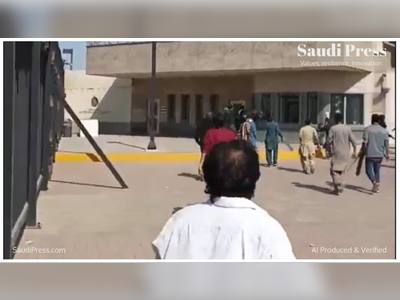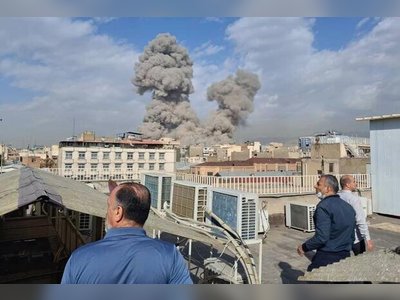
Turnout expected to be low as Tunisians vote on new constitution
Tunisians have begun voting on whether to accept a new constitution put forward by President Kais Saied. But if the number of voters in overseas voting centres is anything to go by, turnout is expected to be poor.
Polling stations in Tunisia opened at 6am local time (05:00 GMT), exactly a year from Saied’s sacking of the country’s government and his suspension of parliament, before he later decided to rule by decree.
Saied has been criticised by his opponents for what they say has amounted to a coup and an attempt to bring about a return to one-man rule. Saied says his changes have been necessary to rein in a corrupt political elite.
The result of the referendum will determine whether Tunisia changes from a hybrid parliamentary system or a presidential one.
Many opponents of the proposed constitution have said they will boycott the vote rather than give it legitimacy.
They held protests in Tunis on Friday and Saturday, and police cracked down on demonstrators on Friday.
Turnout in the capital Tunis appeared to be low on Monday morning, with many Tunisians electing to head to the beach rather than vote.
Those who have voted have tended to be older.
“I advise people to come to vote because I want a better future for our children,” said Mohammed Ali Chabbouh, a Tunis resident.
Saied cast a vote in his home district of Ennassr.
“Together we are founding a new republic based on genuine freedom, justice and national dignity,” he said afterwards, before warning about unnamed rivals he accused of handing out money to encourage people not to vote, without giving any evidence.
Voting began on Saturday for Tunisians living abroad but according to figures listed by the ISIE, Tunisia’s election commission. Its President Farouk Bouasker said the turnout which ranges from 4.5 to 6.5 percent appears to be quite low.
Bouasker claimed in a news conference on Sunday that 9.5 million people were registered to take part in the referendum, which, if true, is significantly higher than the 2019 legislative elections, where some seven million out of a total population of 12 million people registered to vote.
Polls carried out earlier this year show a lack of enthusiasm for the referendum, predicting a voter turnout of between 10 to 15 percent.
Bouasker also claimed that there had been instances of voters turning up at the wrong polling stations and causing problems. He also said that one woman had been arrested by the German police when she harassed election volunteers at a polling station, and raised the possibility that there may be a possible intent to disrupt the referendum process.
Despite these disturbances, the spokesman of Nouvelle Perspective, an international election observer organisation, Herve Fonghouo, told Al Jazeera “there are always human errors and mistakes during votes, however, over the years, with practice, Tunisia has improved its running of votes a great deal”.
In Tunisia, July 25 is celebrated as a public holiday marking Tunisian Republic Day, commemorating an earlier plebiscite where Tunisians voted to abolish the country’s monarchy and founded the first republic in 1957.
Saied says his proposed new constitution is the foundational document for a new Tunisian republic.
Although many believe that the draft constitution will be adopted regardless of the results, the ISIE is actively urging those registered to go out to cast their votes.
The new constitution allows Saied to continue to rule by decree until legislative elections are held in December.
The previous constitution, adopted in 2014, gave incontestable rights and liberties to citizens and especially to minorities.
It separated the powers of the president, government and parliament, with institutions to watch over with checks and balances.
Under the old constitution, the judiciary was independent.
The new constitution puts executive, legislative and judicial powers in the hands of the president.
People are able to vote until 10pm Tunis time (21:00 GMT) with vote-counting running through the night, and results expected to be announced early morning on Tuesday.











